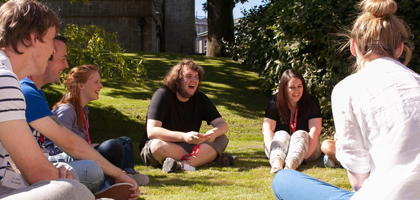MA Applied Psychology (Mental Health)

The MA in Applied Psychology (Mental Health) gives you an advanced understanding of the discipline of psychology in mental health settings. The course is designed to help you to appreciate both the potential and values of applied psychology, to think critically about psychological theory and practice, and to give you the opportunity to explore your own particular interests. It offers you an opportunity to develop a clear understanding of the practice of a professional psychologist, to advance understanding of mental health services, and to connect theory to practice under the supervision of either a clinical or counselling psychologist.
Applied psychologists use research and theory to analyse real-world situations, develop appropriate interventions, and evaluate outcomes. The course will enable you to pursue postgraduate professional training opportunities, and to pursue a variety of career paths where psychological expertise in mental health is needed.
The MA in Applied Psychology (Mental Health) was shortlisted for the Best New Postgraduate Course in the GradIreland Higher Education Awards in 2018.
To Find Out More: CKD39 www.ucc.ie/en/ckd39/
Frequently Asked Questions
How long is the course?
One full (calendar) year. We start and end in September.
Is there a part-time option?
No. Because it isn’t possible to hold a placement position simultaneously open, despite not being occupied, we do not normally allow the course to be completed part-time.
What are the fees?
€7000 for EU students, €16000 for non-EU
When is the closing date for application?
March 11th 2024
What are the entry requirements?
A candidate for this MA programme must:
- Hold an honours undergraduate degree in Psychology.
- Satisfy the eligibility requirements for graduate membership of the Psychological Society of Ireland or the British Psychological Society. This can be demonstrated by:
- Evidence that your undergraduate degree is accredited by the PSI or BPS (see www.bps.org.uk) or
- Evidence from the BPS that they consider your undergraduate degree to be equivalent to a PSI/BPS accredited degree, in terms of granting you eligibility for graduate membership of the society
We also require four hundred words detailing a research proposal that you could undertake while here. Although you are not held to this during your MA it must be a reasonable, relevant, and possible focus of research.
If these parts are successful, you will be invited for a competitive interview.
How do USA GPAs translate to an Irish 2:1?
A GPA of 3.3 (on a 4-point scale) is a 2:1, so this or above is required.
Are the entry requirements different for non-EU students?
No. We apply the Bologna rules uniformly
When will I hear about the results of my application?
Interview outcomes are posted in late May. Further offers may be made later in the year.
Where will my placement be?
All placements will be supervised in a work setting relevant to the programme of study. Placements will run two days a week (usually Thursdays and Fridays) for at least six months (340 hours minimum)
Can I choose where my placement will be?
No, they are randomly assigned (as they would be in clinical practice). Note that in applying you are agreeing that you are both willing and able to travel to a placement which could be anywhere across Ireland (although in practice almost all take place in Cork)
Can placements take place outside of term time?
We encourage students to get as much experience as they can with their placement, although scheduled time is within term time
I do not have an academic referee, can I use a professional one?
Yes, as long as they speak to the qualities needed for the course
I do not have a professional referee, can I use an academic one?
Yes, as long as they speak to the qualities needed for the course.
Is this course suitable for mature students?
Yes, very much so.
What sorts of assessments are used on the course?
We use a variety of assessments including, but not limited to, essays, coursework, reflective portfolios and therapeutic role-plays. Class-room participation is very important.
How is the timetable structured?
All lectures take place during the day, typically Monday to Thursday.
Where do people go after the course?
Most students go on to assistant psychology posts, further training, research positions, or clinical training. We are well-regarded as a starting point for these careers in Ireland. For example, seven of the Irish Prison Services paid AP positions last year were awarded to SoAP graduates.
Do I need previous experience working in the field of mental health?
No, but historically it is unusual for students not to have had some volunteer work in mental health practice
I am interested in doing the MAAP (MH) but I only have [X] credits in psychology and I'm afraid that I don't make the requirements to do this masters next year. Can I still apply?
You would need to complete the HDip conversion course first.
Can you recommend the sort of prior experience that would fit with the course?
Most of our applicants tend to have done some voluntary work (such as the Samaritans) and often some professional work in mental health care. Occasionally we get someone who imaginatively shows how their non-health-care related work has developed relevant experience. A good question to ask yourself is “What experience of the world have I had that made me want to do this in the first place?”
